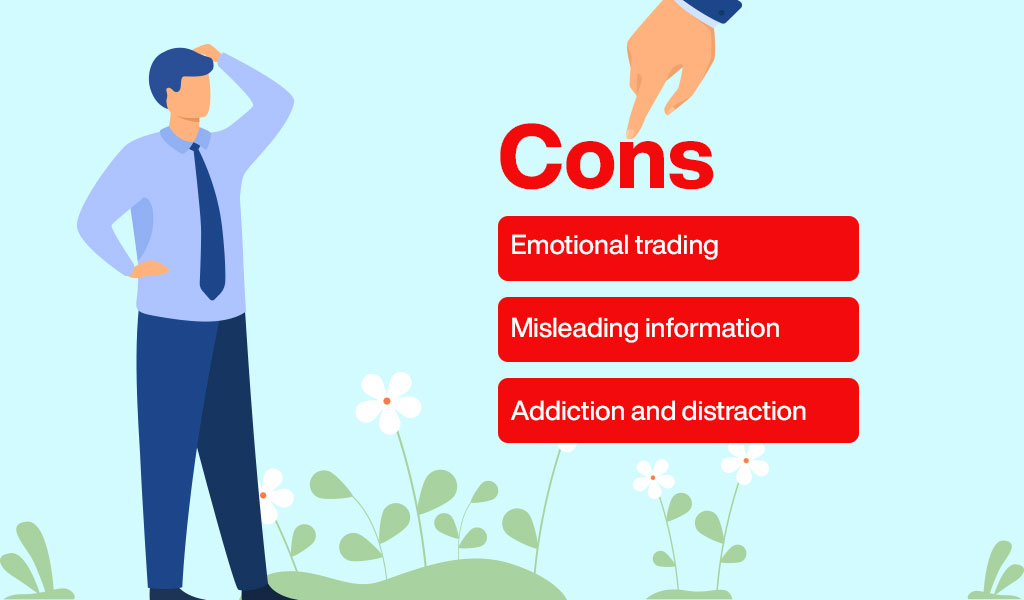 Social media is part of our daily lives today. Be it updating any life event or knowing any gossip about your favorite celebrity, social media has all the solutions. But did you know apart from being a career option for some of the youth today, social media also has a huge impact on your investments? You may have come across many reels or posts showing the benefits of a particular investment option and influencing you to know more about them, right? This is the power of social media today. So does it really impact your investment portfolio? Read on to know more about it here. Read More: What are the differences between equity markets and debt markets
Social media is part of our daily lives today. Be it updating any life event or knowing any gossip about your favorite celebrity, social media has all the solutions. But did you know apart from being a career option for some of the youth today, social media also has a huge impact on your investments? You may have come across many reels or posts showing the benefits of a particular investment option and influencing you to know more about them, right? This is the power of social media today. So does it really impact your investment portfolio? Read on to know more about it here. Read More: What are the differences between equity markets and debt markets
 Our generation has grown up hearing the mutual funds ads and the disclaimer it has at the end. While there are many spoofs of the same available on the internet, one cannot deny that it definitely increased the mutual fund market greatly. For the current lot of youngsters, their source of information and updates is majorly through social media platforms. Some of the most popular among this lot are platforms like LinkedIn, YouTube, Facebook, Twitter, and Instagram. They all cater to a different kind of audience and the level of information that is available on such portals. For example, LinkedIn is a professional platform that attracts steep talent and the most accurate information that is used by such professionals to create or base their opinions about different sectors, investment products, etc. On the other hand, platforms like Facebook or Instagram, are information-sharing platforms where a person can get snippets of information related to different investment options in a very dramatic and attractive format. Many old-timers may think that this is not adding any value to the decision-making process but it actually plays a huge role in influencing the opinion of the investors. Such reels and similar formats create an interest among the investors intriguing them to know more about the investment options along with their pros and cons. There has been a steady increase in the number of influencers having a financial background that provides valuable information about various financial products. Many from this breed of influencers, often known as ‘Fin-Fluencers’ have also made it their career to provide verified financial information and opinion about these financial products. The reach of such influencers cannot be ignored which is evident from a recent study conducted by the Asia-Pacific Journal of Management and Technology where it was seen that approximately 92% of the people surveyed had come across financial content on their social media platforms. Approximately 47% of them were influenced to learn more about such products and about 32% were influenced to invest as well. Among the many options, the most preferred investment option was seen to be mutual funds and about 65% of the surveyed population agreed that the content they saw was helpful to them. This was a small study conducted in 2021 and the results nevertheless were quite interesting which reflected the changing dynamics of our society and the impact of various social media platforms not only on our daily lives but also on our finances.
Our generation has grown up hearing the mutual funds ads and the disclaimer it has at the end. While there are many spoofs of the same available on the internet, one cannot deny that it definitely increased the mutual fund market greatly. For the current lot of youngsters, their source of information and updates is majorly through social media platforms. Some of the most popular among this lot are platforms like LinkedIn, YouTube, Facebook, Twitter, and Instagram. They all cater to a different kind of audience and the level of information that is available on such portals. For example, LinkedIn is a professional platform that attracts steep talent and the most accurate information that is used by such professionals to create or base their opinions about different sectors, investment products, etc. On the other hand, platforms like Facebook or Instagram, are information-sharing platforms where a person can get snippets of information related to different investment options in a very dramatic and attractive format. Many old-timers may think that this is not adding any value to the decision-making process but it actually plays a huge role in influencing the opinion of the investors. Such reels and similar formats create an interest among the investors intriguing them to know more about the investment options along with their pros and cons. There has been a steady increase in the number of influencers having a financial background that provides valuable information about various financial products. Many from this breed of influencers, often known as ‘Fin-Fluencers’ have also made it their career to provide verified financial information and opinion about these financial products. The reach of such influencers cannot be ignored which is evident from a recent study conducted by the Asia-Pacific Journal of Management and Technology where it was seen that approximately 92% of the people surveyed had come across financial content on their social media platforms. Approximately 47% of them were influenced to learn more about such products and about 32% were influenced to invest as well. Among the many options, the most preferred investment option was seen to be mutual funds and about 65% of the surveyed population agreed that the content they saw was helpful to them. This was a small study conducted in 2021 and the results nevertheless were quite interesting which reflected the changing dynamics of our society and the impact of various social media platforms not only on our daily lives but also on our finances.
Social media can have both positive and negative impacts on investing, especially for new investors in India. Here are some of the key pros and cons to keep in mind.
 Some of the advantages or positive impacts of social media on investing are discussed below.
Some of the advantages or positive impacts of social media on investing are discussed below.
Social media can be a great source of financial news, analysis, and expert opinions. With just a few clicks, investors can access a wealth of information on the stock market, specific companies, and the global economy. This can help investors make more informed investment decisions and stay up-to-date on the latest developments in the market.
Social media platforms can provide access to a variety of educational resources like tutorials, webinars, and seminars. These can help new investors learn more about the market, trading strategies, and investment options. For instance, YouTube channels and podcasts dedicated to investing can be a great source of knowledge and inspiration for new investors.
Social media can help new investors connect with other investors, traders, and experts, providing them with insights, feedback, and support. They can join groups and forums dedicated to investing, follow influential investors and traders, and engage in discussions and debates about the market. This can help new investors learn from the experiences of others and gain confidence in their investment decisions.
 The negative or adverse impact of social media on investing is highlighted below.
The negative or adverse impact of social media on investing is highlighted below.
Social media can also trigger emotional trading, where investors make hasty decisions based on their emotions or the opinions of others on social media. For instance, if a tweet from a prominent investor causes a stock to soar, new investors might feel FOMO (fear of missing out) and buy the stock without doing proper research. This can lead to impulsive decisions and unnecessary risks.
One of the biggest downsides of social media is the prevalence of misleading information, rumors, and fake news. It's easy for false or exaggerated claims to go viral on social media, and this can mislead investors and affect their investment decisions. New investors should be wary of sensational headlines, unverified sources, and hype-driven posts on social media.
Finally, social media can be addictive and can distract investors from important investment research, analysis, and decision-making. New investors should be mindful of the time they spend on social media and set boundaries to avoid getting sucked into endless scrolling or meaningless debates. It's important to stay focused on the big picture and not get distracted by short-term noise on social media.
The influence of social media in the country started more than a decade back and is constantly on the rise. The world today is so integrated and dynamic that opinions are formed and broken within minutes and not days. However, the generation today is quite smart and wants to make informed decisions. So while the social media impact on investing patterns and its popularity is definitely increasing, they cannot be the sole source of information for investment decisions. So what do you think of social media, is it just a source of entertainment or an ocean of information? And how do you use it? Let us know of you have any queries about any investment product that you have come across on your social media feed and we will be happy to help you out. Till then Happy Reading!

NSE Stock Prices in Excel in Real Time - Microsoft Excel is a super software cap...

Buying shares from the stock market seems to be an easy task - as it can be done...

Market eye filters is made creatively to help you take advantage of market oppor...

There are very few things that investors agree on, and one of them is that earni...